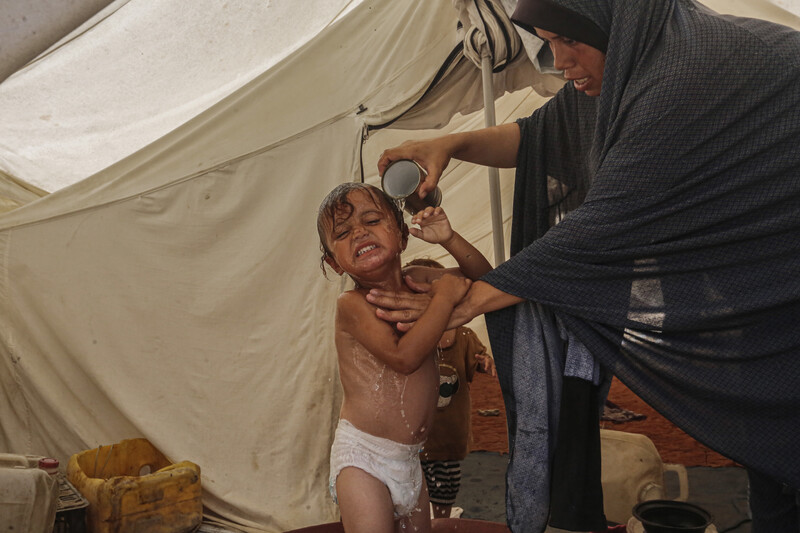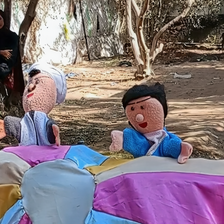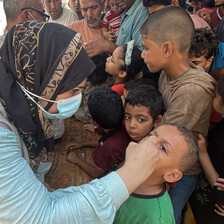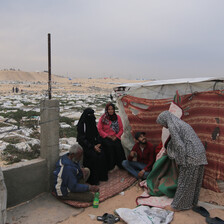The Electronic Intifada 11 September 2024

A woman washes her young child with a cup of water in their makeshift shelter in Deir al-Balah on 10 July. Israel has cut off water supplies and bombed water facilities causing to a 94 percent drop in Gaza’s water supply.
APA imagesEverything changed in our lives when my 12-year-old daughter Saeda woke up with yellow eyes.
At first I thought Saeda, the oldest of my five children, was just suffering from simple fatigue due to malnutrition and the difficult life we have been living for many months, displaced as we are to a tent.
But after she began complaining of severe stomach pain, I called a doctor, Hossam Abu Qamar, to examine her.
The doctor, who lives with his family in the same refuge as we do, came quickly when I told him that her eyes were yellow.
“Saeda must be isolated immediately. She has hepatitis A,” Dr. Qamar said after a quick examination.
Hepatitis A is reportedly spreading rapidly among the displaced people in the Gaza Strip, due to overcrowding, poor hygiene and contaminated water, the only water we have access to.
According to the UN in August, 40,000 cases of the disease had been diagnosed. There were just 85 cases in all of Gaza before October last year.
Qamar asked us to stop feeding Saeda anything except sweet-tasting food, including honey, molasses and grapes.
He also recommended that she wash herself daily in her own space and away from others.
“Saeda should remain isolated for at least three weeks. We don’t want anyone else to get infected,” Dr. Qamar said.
Shunned
My daughter said she started feeling like an outcast among her friends, mostly girls her age, who began to distance themselves from her.
She was distressed and crying, an upset not made better by my inability to give her a hug.
I took Saeda to a hospital run by the United Nations Relief and Works Agency for Palestine Refugees (UNRWA) to get some medication for her stomach pain.
It was crowded and filled with sick, displaced people. We waited two hours for our turn to see the doctor.
The doctor agreed with Qamar that Saeda was suffering from hepatitis and should be isolated. Unfortunately, he said, the hospital had no pain medicine left to offer us.
Our wait had been futile.
In our tent, we tried to implement the doctor’s recommendations to isolate Saeda.
Her father brought some wood and nylon and built a small tent for her to stay in by herself. I put a mattress and pillow in the tent and told her that she had to start sleeping and eating alone and should no longer share with her siblings.
Because the infection is also transmitted through feces, her father dug a hole in the ground and covered it with a piece of plastic with a hole in the middle.
“You will no longer have to share the bathroom with us,” I told her, trying to be positive. “This is your private bathroom.”
But Saeda only started crying again.
Eventually, I allowed my other children to join Saeda in drawing, as long they sat at least two feet away from her. Sometimes they sing together.
It was not only Saeda who felt isolated. Friends started avoiding mixing with any of us or shaking our hands.
Women I used to make bread with avoided me. Now, I have to make bread alone.
Water and school
The biggest problem was hygiene. In order for her to wash daily, we needed water.
There is precious little water accessible in Gaza. Israel has cut off water supplies from outside Gaza and destroyed water facilities inside Gaza. International organizations estimate that there has been a 94 percent drop in the territory’s water supply.
According to a report issued by the Palestinian Central Bureau of Statistics, the average per capita consumption in the Gaza Strip was 84.6 liters of water per day before the war. It has dropped to between 3-15 liters per day during this genocide, roughly the amount people in wealthy countries use with one flush of the toilet.
The World Health Organization recommends that in order to meet minimal health and basic drinking and hygiene needs, every individual needs between 50 - 100 liters a day.
Saeda’s illness meant we needed to somehow obtain more water for her personal hygiene.
But because the amount of water for the residents of the shelter where we live is so limited – the seven of us have to share about 60 liters a day for all our needs – many refused our request to increase the amount of water for our family, because that would reduce their share of it to even less.
My husband found that his only option was to obtain extra water from a charity about a mile away. This has now become his daily walk.
Meanwhile, Saeda’s illness has also affected the kids’ improvised schooling in the camp. Saeda and her siblings used to take lessons in English and mathematics in an educational tent established by some displaced teachers.
But they told me that they could not accept Saeda until she was cured of the hepatitis. They applied their zero-tolerance approach to her non-infected siblings too.
I understood all of this. But as I sat alone, I suddenly broke down in tears. We try as hard as we can. But in moments, this life of displacement and desperation becomes more than I can bear.
I turned on the radio on my mobile phone and heard that there was talk of a new round of ceasefire negotiations. I didn’t care much. This was, what, the tenth time — rhetorically speaking — that the war was about to end?
It didn’t end.
I fear we will be stuck here forever.
Rasha Abou Jalal is a writer and journalist from Gaza. On Twitter/X: @rashaaboujalal1





